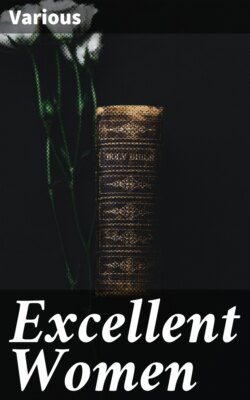Читать книгу Excellent Women - Various - Страница 43
На сайте Литреса книга снята с продажи.
LADY HUNTINGDON'S CHAPELS.
ОглавлениеFrom the appointment of Whitefield as her chaplain, Lady Huntingdon took a commanding position in the development of that section of Methodism which looked rather to Whitefield than to Wesley as its leader, and which held Calvinistic views. Around the Countess gradually gathered such fellow-workers as Romaine, Venn, Toplady, Fletcher of Madeley, and many others equally with them aflame with love for the perishing souls of men. Religion having become largely a mere matter of outward form where it was not wholly ignored, great numbers of the clergy being both ignorant of the true nature of the Gospel and very unwilling that others should preach it, Lady Huntingdon was led to establish chapels in different parts of Great Britain. In some parts she rented buildings; in others she built chapels; and gradually a considerable number of places of worship, largely originated by her, and almost wholly sustained by her, came into being. She herself always wished these to remain connected with the Church of England. She endeavoured to keep their pulpits supplied with clergymen of her way of thinking, and for a time succeeded. But the growth of the work early led her to apply the free agency of lay preachers; and later in life the refusal of the Church of England, upheld by the Courts, to consider her action legal in considering them to belong to the Established Church, drove her in self-defence to constitute her chapels into a connexion with a legal standing and rights. The hostility on the part of many within the Established Church of the eighteenth century, to true New Testament ministry and practice, on the one hand expelled the Wesleyans from the National Church, and on the other compelled Lady Huntingdon to add one more to the dissenting bodies.
The most noted of the churches which thus came into being were those at Brighton, Bath, and Spa Fields. The first named stood upon the site in North Street, now occupied by a later, larger, and more ornate structure. Whitefield visited Brighton, first preaching there in the open air in 1759. This led to the formation of a Christian Society, and in 1761 Lady Huntingdon built a chapel, to defray the cost of which she sold her jewels, realising in this way the sum of nearly £700. The building was opened in 1761, Martin Madan conducting the first services, and being immediately succeeded by such notable preachers as Romaine, Berridge, Venn, and Fletcher.
Lady Huntingdon's connection with Bath began as early as 1739, and for the next twenty-five years she was frequently in that fashionable resort; but it was not until 1765 that she bought the land and established the famous Vineyards Chapel. On October 6, 1765, the chapel was dedicated, and Whitefield preached the first sermon. "Though a wet day," he wrote, "the place was very full, and assuredly the Great Shepherd and Bishop of souls consecrated and made it holy ground by His presence." Romaine and Fletcher often preached at Bath in the early months of the chapel's history, and the latter thus referred to his ministry: "This place is the seat of Satan's gaudy throne; the Lord hath, nevertheless, a few names here, who are not ashamed of Him, and of whom He is not ashamed, both among the poor and among the rich."
It was in this chapel that there was the noted "Nicodemus Corner," a seat carefully shrouded from the public gaze, where sometimes a nobleman and sometimes a bishop heard the goodness of the Gospel.
In this connection may be quoted the following anecdote, given in the Life of Mary Anne Schimmelpenninck, who visited Bath with her mother in 1788. She writes:—
"My mother grew better, she frequently took me with her to the Pump Room, and she sometimes told me anecdotes of those she had seen there when a child. On one occasion, when the room was thronged with company—and at that time the visitors of Bath were equally distinguished for rank and fashion—a simple, humble woman, dressed in the severest garb of the Society of Friends, walked into the midst of the assembly and began an address to them on the vanity and follies of the world, and the insufficiency of dogmatic without spiritual religion. The company seemed taken by surprise, and their attention was arrested for a few moments; as the speaker proceeded, and spoke more and more against the customs of the world, signs of disapprobation appeared. Amongst those present was one lady with a stern yet high-toned expression of countenance, her air was distinguished; she sat erect, and listened intently to the speaker. The impatience of the hearers soon became unrestrained. As the Quaker spoke of giving up the world and its pleasures, hisses, groans, beating of sticks, and cries of 'Down, down!' burst from every quarter. Then the lady I have described arose with dignity, and slowly passing through the crowd, where a passage was involuntarily opened to her, she went up to the speaker, and thanked her, in her own name and in that of all present, for the faithfulness with which she had borne testimony to the truth. The lady added, 'I am not of your persuasion, nor has it been my belief that our sex are generally deputed to be public teachers; but God who gives the rule can make the exception, and He has indeed put it in the hearts of all His children to honour and venerate fidelity to His commission. Again I gratefully thank you.' Side by side with the Quaker she walked to the door of the Pump Room, and then resumed her seat. This lady was the celebrated Countess of Huntingdon." [1]
[Footnote 1: Autobiography of Mary Anne Schimmelpenninck, vol. 1. pp. 89, 90.]
